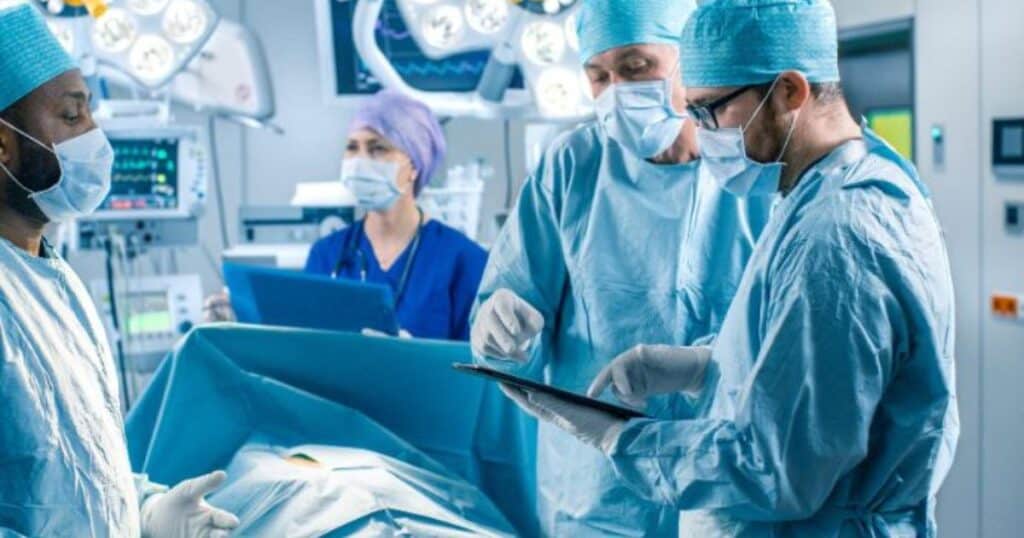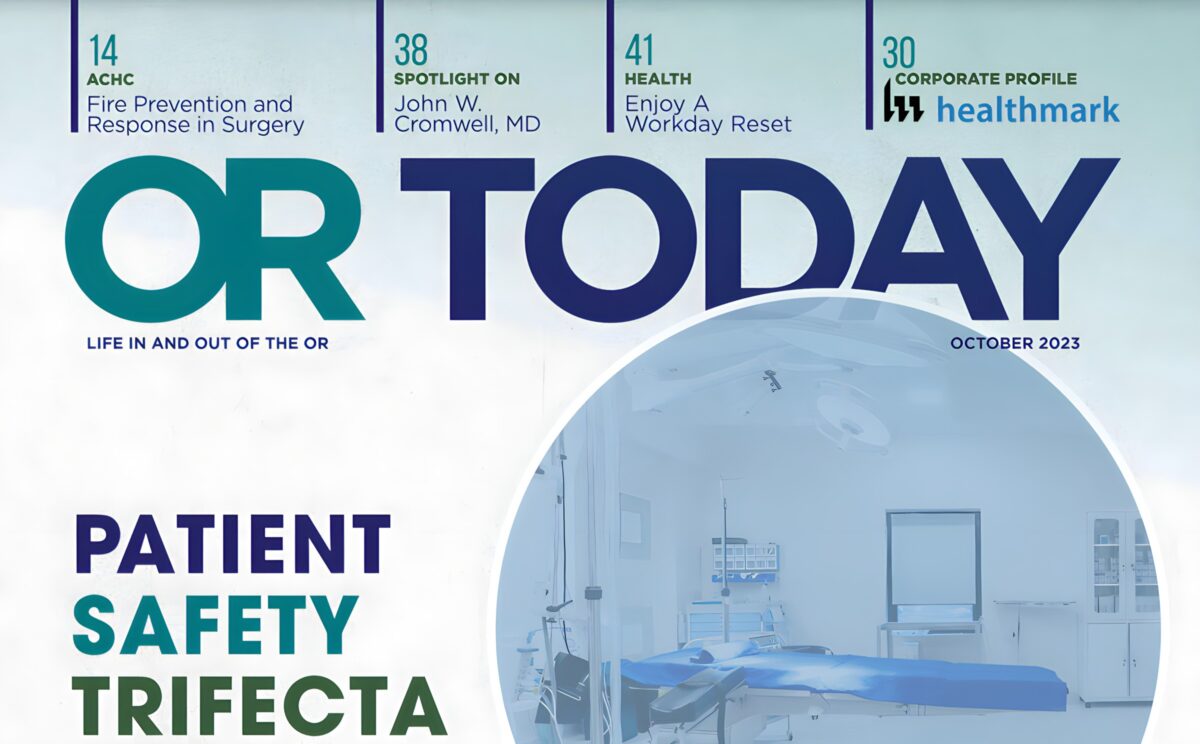
Article
HealthLeaders Interview: The Benefits of Data-Driven Surgery
Learn More

Caresyntax Article
November 3, 2023
The following article is a repost of an interview that originally appeared in OR Today “Spotlight On: John W. Cromwell, MD” with Caresyntax customer, John Cromwell, MD, FACS, associate chief medical officer and director of surgical quality and safety at University of Iowa Hospitals and Clinics.
John W. Cromwell’s interest in the technical side of health care was encouraged at a young age. As a high-schooler growing up in Norfolk, Nebraska, he landed a job developing X-rays in a community hospital in the year before he left for college. The work afforded him the opportunity to develop relationships with surgeons there who fostered his enthusiasm for the work through their mentorship, setting him on a path to pursue his own career as a physician.
“We have people from all parts of the country – trainees, new nurses, new faculty – and we’re constantly trying to align people on their responsibilities, and what we’re trying to achieve on a daily basis,” Cromwell said. “Our goal is to keep our team members around, and engaged, and focused on creating the best outcomes for our patients. When you create friction because you have inexperienced team members who don’t work together and aren’t aligned on who’s doing what, that’s a problem.”
“I was so interested in what they were doing, and enthusiastic, and they took me under their wing and showed me around,” Cromwell said. “If you have a good experience with a group of people who are like-minded and enthusiastic and supportive, you gravitate towards those things. I’ve had those a few times in my career and those experiences help.”
Cromwell had a comparable experience in medical school, in which a small and supportive professional community – namely, colorectal surgeons – invited him into their fold while he was working through his residency. Three of the eight years of his surgical education were required to be research-based, and the invitation to scrub up with the colorectal surgery group led Cromwell to discover that he enjoyed performing the procedures as much as he appreciated the camaraderie.
“No one usually goes into medical school wanting to be a colorectal surgeon,” Cromwell said. “Surgeons all have slightly different personalities, and I think the colorectal surgery community in general is a smaller subspecialty, which is pretty close-knit. They invited me to join them, and I learned that I liked the technical skills that were required for pelvic surgery.”
The University of Texas Medical Center, where Cromwell completed his residency, was a high-volume environment in which surgeons learned to perform to the best of their abilities through repetition. In the course of a single year, Cromwell estimated that he performed some 1,200 surgeries, honing his technique and approach to patients of all body types.
“That was really the finishing school to learn how to repeat these cases enough that you could learn it really well,” he said.
From Texas, Cromwell then joined the Moffitt Cancer Center at the University of South Florida campus in Tampa, where he spent four years in an academic colorectal surgery program. Cromwell was subsequently recruited by the University of Tennessee to establish a colorectal program at its Memphis campus; he worked there for nearly three years until the family relocated to the Midwest after the birth of their daughter.
Through 13 years at the University of Iowa Hospitals and Clinics, Cromwell has risen to the position of associate chief medical officer (ACMO) and director of surgical quality and safety. Most of his day-to-day work is spent addressing issues of surgical quality and safety, the better to improve the quality of outcomes and case volume in the surgical environment – especially in a post-COVID-19 (novel coronavirus) climate where health care resources are stretched in many ways.
“Prior to the pandemic, there’s been lots of staffing challenges for hospitals, including closures of critical-access hospitals across the country,” Cromwell said, “and that’s changed how academic medical centers have functioned.
“People are living longer, but they’re not necessarily living healthier lives,” he said. “A lot of our patients are sicker, which changes your safety approach, and changes decision-making. We’re trying to be more data-driven about how we treat our patients, and develop optimization for that.”
To that end, Cromwell said his facility has begun working with a surgical data platform developer called Caresyntax, which leverages data collected in the operating room to inform strategies and benchmarking used in staff training and professional development.
For the last several years, Cromwell has worked to establish an interdisciplinary structure that integrates the perspectives of teams involved with surgical safety and operations, the better to improve patient outcomes. Much of its work involves analyzing safety events that happen in surgical spaces, and trying to be proactive about preventing them in the future. It’s common for the group to revisit basic routines, review responsibilities and establish pipelines for addressing concerns, all in the service of team-building.
“We have people from all parts of the country – trainees, new nurses, new faculty – and we’re constantly trying to align people on their responsibilities, and what we’re trying to achieve on a daily basis,” Cromwell said. “Our goal is to keep our team members around, and engaged, and focused on creating the best outcomes for our patients. When you create friction because you have inexperienced team members who don’t work together and aren’t aligned on who’s doing what, that’s a problem.”
To that end, Cromwell said his facility has begun working with a surgical data platform developer called Caresyntax, which leverages data collected in the operating room to inform strategies and benchmarking used in staff training and professional development.
“Now we’re able to improve onboarding by creating this robust library of how we do things in this program in various specialties, and measure resident performance in a very objective, systematic way, so we can monitor how those skills are changing from year one to the time they go out,” Cromwell said.
In addition to Cromwell’s surgical leadership roles, he also heads up a research laboratory at the University of Iowa that’s commercializing new technologies in the field of computational health, all of which are geared toward preventing adverse surgical events. Among the projects that it’s spinning out are a process to identify acoustic biomarkers related to post-operative ileus (Cromwell was inspired by Cornell researchers working to reducing bird strikes at airports by charting their songs) and a screening device for hospital delirium, which he said can affect 20 to 50 percent of patients aged 60 and older. The lab is also building an AI-based platform that will process health records data in an attempt to identify patients at the highest risk of contracting a surgical infection.
“Now we’re able to improve onboarding by creating this robust library of how we do things in this program in various specialties, and measure resident performance in a very objective, systematic way, so we can monitor how those skills are changing from year one to the time they go out,” Cromwell said.
“I’ve tried to keep it aligned with things that I do every day,” he said.
When he’s not at work, Cromwell enjoys travel, cycling and cooking meals with his family.